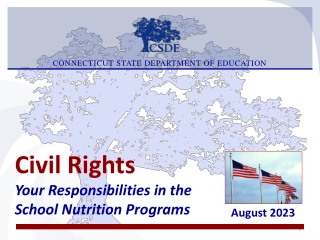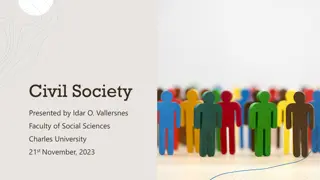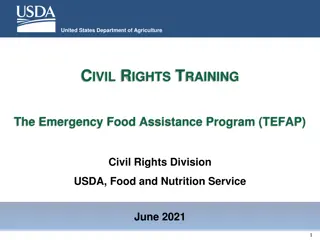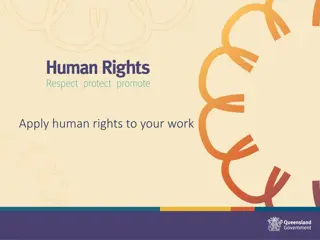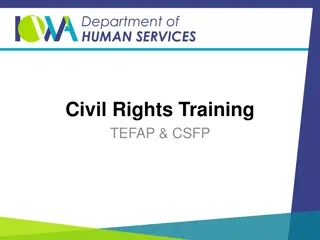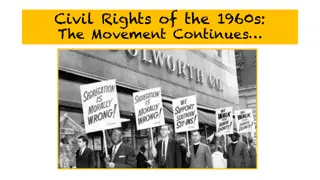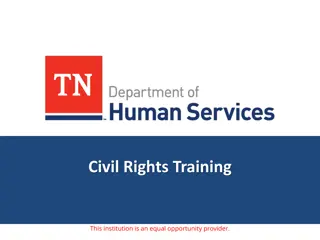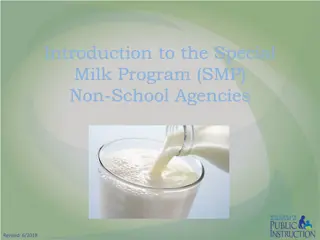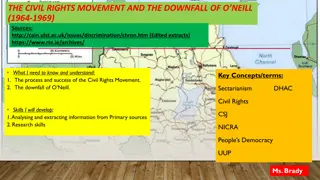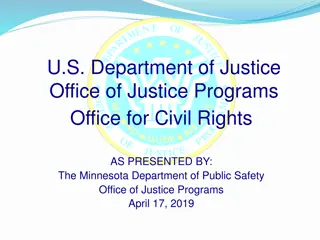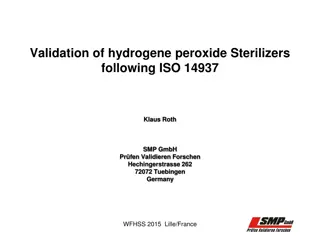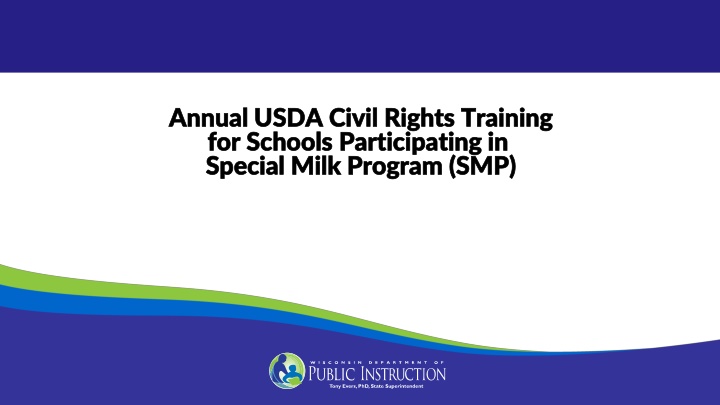
Civil Rights Training and Requirements for Schools in the USDA Special Milk Program
Explore the purpose, federal and Wisconsin state laws regarding discrimination, protected classes, and public notification requirements for schools participating in the Special Milk Program. Learn about staff responsibilities, applicant rights, and how to inform the community effectively.
Download Presentation

Please find below an Image/Link to download the presentation.
The content on the website is provided AS IS for your information and personal use only. It may not be sold, licensed, or shared on other websites without obtaining consent from the author. If you encounter any issues during the download, it is possible that the publisher has removed the file from their server.
You are allowed to download the files provided on this website for personal or commercial use, subject to the condition that they are used lawfully. All files are the property of their respective owners.
The content on the website is provided AS IS for your information and personal use only. It may not be sold, licensed, or shared on other websites without obtaining consent from the author.
E N D
Presentation Transcript
Annual USDA Annual USDA Civil Rights for Schools for Schools Participating in Special Milk Program (SMP Special Milk Program (SMP) ) Civil Rights Training Participating in Training
Purpose of Civil Rights Training Purpose of Civil Rights Training Inform, educate, and support all staff who interact with Special Milk Program (SMP) applicants Describe staff rights and responsibilities as administrators of SMPs Instruct on general USDA civil rights requirements Share resources and information available to assist in civil rights responsibilities
Federal Federal Law Law Prohibits Discrimination Prohibits Discrimination of Protected Protected Classes: Classes: of Sex Race Disability Color Age National Origin
Protected Classes under Wisconsin State Law Protected Classes under Wisconsin State Law Adds protections for persons with regard to religion, creed, ancestry, pregnancy, marital status, parental status, and sexual orientation Adopts all other federal protected classes except for color
Protected Classes under Wisconsin State Law Protected Classes under Wisconsin State Law All federal child nutrition programs, including SMP, operating in public school districts in Wisconsin must adopt both federal and state protected classes (private schools must only adopt federal)
Requirements of Public Requirements of Public Notification Notification To inform community (especially under- represented groups) that school participates in the SMP To reach as many participants and those potentially eligible for free milk as possible
Requirements of Public Notification Requirements of Public Notification Must include: Eligibility Benefits and services (milk at no or low charge) Program availability (e.g., location of school, delivery points, hours of service) Applicant rights and responsibilities *Only for Pricing with Free Milk Option programs Procedures for filing a complaint Nondiscrimination policies Any programmatic changes (e.g., changing location of a milk service)
Methods of Public Notification Methods of Public Notification Post And Justice for All poster (required for all SMP pricing options) Includes the USDA s nondiscrimination statement and lists the USDA contact information for filing a complaint of discrimination Public Release (only for Pricing Plan with Free Milk Option programs) Inform the general public that school participates in the SMP and offers free milk Other methods of public notification (optional) Bulletins, Letters/Leaflets/Brochures, Internet/Computer-based applications
And Justice for All And Justice for All Poster Poster Must display in a prominent area, visible and readable to program participants, near the serving area Must be posted at every site Must be 11 x 17 format
And Justice for All Posters And Justice for All Posters DPI provides posters to school free of charge To order, call 608-267-9228
Public Public Release Release Pricing Plan with Free Milk programs) (Only for (Only for Pricing Plan with Free Milk programs) Required to send to media and grassroots organizations prior to or at the beginning of each school year: Media (e.g., local/community newspapers, radio, television) Grassroots organizations that reach minority or under-represented groups (e.g., churches, refugee/immigrant settlement services, laundromats, social service agencies, libraries, grocery stores, WIC offices, food pantries, senior centers, physician offices/clinics)
Public Public Release Release Pricing Plan with Free Milk programs) (Only for (Only for Pricing Plan with Free Milk programs) In addition, send the release to major employers contemplating or experiencing large layoffs and local unemployment offices, as applicable
Public Release Public Release Template available on DPI SMP website http://dpi.wi.gov/school-nutrition/milk-programs/special-milk Keep documentation on file of where release was sent and the date submitted Schools are not required to pay to have the release published, but it must be submitted with the intent to have it published
USDA Nondiscrimination USDA Nondiscrimination Statement Statement Required on ALL forms of SMP program materials and communications for school families and the public The State of Wisconsin nondiscrimination statement is not required to be posted Current English and Spanish statements available at: http://dpi.wi.gov/sites/default/files/imce/school- nutrition/doc/nondiscrimination-statement.doc http://dpi.wi.gov/sites/default/files/imce/school- nutrition/doc/nondiscrimination-statement-spanish.doc
USDA Nondiscrimination USDA Nondiscrimination Statement Statement If any material or document is too small to permit the full statement, as linked in the previous slide, the material MUST include: This institution is an equal opportunity provider.
USDA Nondiscrimination USDA Nondiscrimination Statement Statement Wording for either statement must be exact and cannot be changed in any way The formatting for the longer statement CANNOT be altered The font size should be the same as the majority used in the document The shorter version may be used for broadcast advertisements/public service announcements
Examples of Examples of Materials Nondiscrimination Nondiscrimination Statement Materials Needing Needing USDA Statement USDA Print Advertisements School Websites Letters Media Flyers Brochures Posters Publications Radio TV Enrollment Forms Menus Parent/Student Handbooks Employee Handbooks Newsletters **Not required for cups, buttons, magnets, pens, etc. due to impractical size
Equity in Program Materials Equity in Program Materials Reflect diversity and inclusion in all program materials, photos, and graphics
Customer Service Customer Service All students must be allowed equal opportunities to participate in SMPs regardless of race, color, national origin, sex, age, disability, or other State protected classes All participants must be treated in the same manner (e.g., seating arrangements, serving lines, services and facilities)
Customer Service Customer Service All students must: Be included in milk service, activities, and discussions Receive equally positive comments, as well as constructive education regarding milk, nutrition, manners, etc. Be held to standards of behavior that are not based on federal and state protected classes
Customer Service Customer Service Students must not be required to use a separate room, separate serving line, or separate serving time based on eligibility for free milk (if applicable), sex, national origin, race, color, disability and age
Separation by Gender Separation by Gender In general, children are not permitted to be separated by gender during the milk service
Separation by Gender Separation by Gender USDA Memo SP 31-2015 allows exemptions with State Agency approval for: Meal service at religious institutions operating under the dictates of the religion with which they are affiliated Meal service at juvenile correctional facilities where combining members of the opposite gender would present a potential safety risk Meal service at facilities that fully separate by gender as part of their normal operations (for example, gender-separated summer camps) The exemption form is located on the DPI website at: http://dpi.wi.gov/school- nutrition/national-school-lunch-program/civil-rights.
Customer Service Customer Service All students in the same grade grouping must be offered the same selection of milk types regardless of their race, color, national origin, sex, disability, age, or eligibility status (applicable to SMP with Free Milk Options programs)
Denial of Milk Denial of Milk USDA prohibits the denial of milk as a disciplinary action The following are circumstances where milk MAY be denied: Disciplinary actions that indirectly result in loss of milk (e.g., student is suspended from school) Students who do not have money to pay for milk
Free Milk Application Free Milk Application Approval (Only for Pricing (Only for Pricing Plans with Free Milk Approval Process Plans with Free Milk Option) Process Option) Admission procedures must not restrict minority persons from enrolling in school or participating in the SMP Students may not be required to participate in the SMP
Confidentiality Confidentiality and Disclosure and Disclosure USDA authorizes schools to release free milk eligibility status ONLY to entities as stated in USDA s Eligibility Manual for School Meals Eligibility information should only be released to those that have legitimate need to know basis
Sharing Information Sharing Information Template Letter (Only for Pricing Plans with Free Milk Option) (Only for Pricing Plans with Free Milk Option) Template Letter Schools must obtain consent from parents/guardians if sharing application information with other programs or using to subsidize school fees Sharing Information Template Letter Identifies how the information will be used Allows for parent/guardian to release or deny information per program Authorizes release of free milk status NO OTHER INFORMATION ON THE APPLICATION MAY BE RELEASED!
Confidentiality and Disclosure Confidentiality and Disclosure Names or other forms of identifying information must not be published, posted, or announced in any manner No overt identification of students approved for free milk by use of special tickets or tokens Approved money and milk accountability in online contract must be followed
Respectful Respectful Language Language Put the person first Example: use person with a disability NOT disabled person Use culturally sensitive language Use inclusive/respectful terms Example: use chairperson NOT chairman
Respectful Language Respectful Language How would I want to be addressed? Am I treating this person in the same manner I treat others? Have I informed this person exactly what information I need and provided clarification when necessary to make a determination on the application? Have I provided this person with information (s)he needs to make necessary decisions?
LEP Language Assistance LEP Language Assistance Limited English Proficiency (LEP): Individuals who do not speak English as their primary language and who have a limited ability to read, speak, write, or understand English All organizations receiving federal financial assistance via participation in Child Nutrition Programs have a responsibility to take reasonable steps to ensure meaningful access to their programs and activities by person with LEP
LEP Language Assistance LEP Language Assistance SMP information is available to all persons in their language Translation and interpretation services are an allowable cost to the program Children should not be used as interpreters; volunteers may be used but should understand confidentiality Verbal communications is provided for those with literacy deficiencies www.lep.gov has more information and resources
Reasonable accommodation Reasonable accommodation for persons disabilities disabilities for persons with with Disability: physical or mental impairment which substantially limits one or more of an individual s major life activities as documented
Reasonable accommodation Reasonable accommodation for persons disabilities disabilities for persons with with Disabilities are defined based on Sect 504 of the Rehabilitation Act/Americans with Disabilities Act and Part B of the Individuals with Disabilities Education Act (IDEA) Examples: Orthopedic/visual/speech/hearing impairments, cerebral palsy, epilepsy, muscular dystrophy, multiple sclerosis, cancer, specific learning disabilities, tuberculosis, diabetes, phenylketonuria, heart condition, food anaphylaxis, mental retardation, emotional illness, drug addiction/alcoholism, HIV, autism, traumatic brain injury
Reasonable accommodation for persons with Reasonable accommodation for persons with disabilities disabilities Provide facilities and appropriate information in alternative formats for persons with disabilities Examples include accessible parking lots, entrances and exits, halls, elevators, rest rooms, service animals, Braille signage and materials, alternative arrangements for service, sign language interpreters, etc. Provide milk substitution for students with disabilities when documented in writing by a licensed medical practitioner
Providing Milk Substitutions Providing Milk Substitutions USDA regulations only require substitutions or modifications for children whose disabilities restrict their diets, such as food allergies causing life- threatening anaphylactic reactions
Providing Milk Substitutions Providing Milk Substitutions Dietary requests based a disability must be documented by a licensed medical practitioner s statement, which must include: The child s disability An explanation of why the disability restricts the child s diet The major life activity or major bodily function affected by the disability The replacement for cow s milk that must be substituted
Providing Milk Substitutions Providing Milk Substitutions For food allergies or intolerances not defined as a disability by the licensed medical practitioner, the school may, but is not required to, make substitutions or accommodations. Remember, lactose free milk can be substituted freely without documentation of a disability and claimed for reimbursement
Racial/Ethnic Data Collection Racial/Ethnic Data Collection Racial/ethnic data is used to determine how effectively your program is reaching potentially eligible children and where outreach may be needed Data must be recorded on an annual basis using the Civil Rights Self Compliance Form (PI-1456)
Racial/Ethnic Data Racial/Ethnic Data Collection Collection Parent, guardian or household may be asked to identify the racial and ethnic group of the participant but are not required to do so Schools may also use the student data base or visual identification for reporting and evaluation
Civil Rights Self Compliance Form (PI1456) Civil Rights Self Compliance Form (PI1456) The Civil Rights Self Compliance Form (PI-1456) is also used to evaluate the school s compliance with civil rights topics Noncompliance: a factual finding that any civil rights requirement, as provided by law, regulation, policy, instruction or guidelines is not being adhered to All instances of noncompliance are considered equally and must be corrected
Examples of Noncompliance Examples of Noncompliance Providing SMP program services, benefits or selecting program sites/facilities that deny individuals access to SMP program on the basis of federal or state protected classes (race, color, national origin, etc.) Denying an individual or household the opportunity to apply for free milk on the basis of federal or state protected classes (race, color, national origin, age, etc.)
Resolution of Noncompliance Resolution of Noncompliance If noncompliance is indicated, a corrective action plan must be implemented immediately to achieve voluntary compliance within 60 days Corrective Action Plan: plan describing the school s actions to be taken to resolve noncompliance with civil rights requirements
Conflict Resolution Conflict Resolution The USDA recommends using an Alternative Dispute Resolution (ADR) program ADR Definition: use of a neutral third party (usually a person acting as a facilitator) to resolve informally a complaint of discrimination through use of various techniques such as fact finding, mediation, peer panels, facilitation, ombudsman support or conciliation
Complaint Complaint Procedures and Information Procedures and Information All schools should have procedures (written procedures preferred) in place for handling civil rights complaints A school may attempt to resolve a situation that is occurring in real time However, if an individual states that they wish to file a civil rights complaint, the school must provide them with the information necessary to do so and not impede an individual s right to file
Right to File a Complaint Right to File a Complaint Complainants may contact USDA to register a complaint within 180 days of the alleged discriminatory action U.S. Department of Agriculture, Office of the Assistant Secretary for Civil Rights, 1400 Independence Avenue, SW, Washington, D.C. 20250-9410, (866) 632-9992 (toll free), (202) 260-1026, or (202) 401-0216 (TDD) USDA Discrimination Complaint form (AD-3027) can be found online at: https://www.ascr.usda.gov/complaint_filing_cust.html
Right to File a Complaint Right to File a Complaint Complainants may contact Wisconsin DPI to register a complaint within 180 days of the alleged discriminatory action Wisconsin DPI: Director, School Nutrition Programs, 125 South Webster Street, P.O. Box 7841, Madison, WI 53707-7841, (608) 267-9121 The form to assist in filing these complaints can be found on the DPI SNT website at https://www.ocio.usda.gov/sites/default/files/docs/2012/Complain_combined_6 _8_12.pdf
Forms of Civil Rights Complaints Forms of Civil Rights Complaints May be written, verbal, or observed May be anonymous Can be related to any area of the Child Nutrition Program operation including administration, employment, milk service, etc.
Handling Civil Rights Complaints Handling Civil Rights Complaints STEP 1: Document the Complaint - Make an effort to obtain all of the following: Name, address, and phone number of complainant (if possible, but not required) Specific name and location of entity delivering the benefit or service The nature of the incident, action, or method of administration that led the complainant to feel discriminated against

